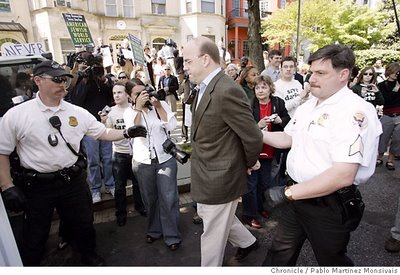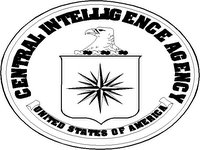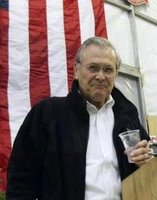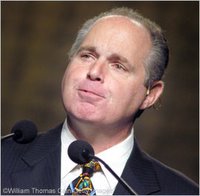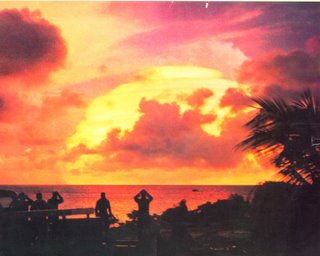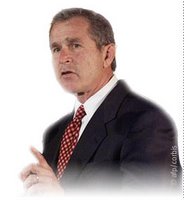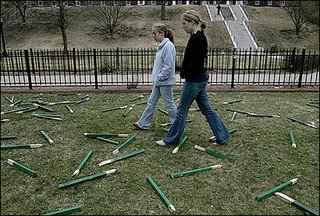 We have heard complaints that President George W. Bush is acting as if he has an “imperial presidency,” of course we cannot forget his remark about how a “dictatorship could be good,” if he were the dictator, and some have pointed to his statements on how his legal staff’s interpretations of the United States Constitution trumps the plain language of what the Congress written into a bill (two of the most publicized are the ban on torture and congressional oversight of the PATRIOT Act).
We have heard complaints that President George W. Bush is acting as if he has an “imperial presidency,” of course we cannot forget his remark about how a “dictatorship could be good,” if he were the dictator, and some have pointed to his statements on how his legal staff’s interpretations of the United States Constitution trumps the plain language of what the Congress written into a bill (two of the most publicized are the ban on torture and congressional oversight of the PATRIOT Act).What is not so well-known to the public is to just what extent he has laid the groundwork for this imperium, by way of the sheer multitude of “signing statements” filed on bills he has signed – over 750.
Because GW has vetoed no bills, he has allowed for no clarification from the Congress on points of the legislation he had issue with. According to a copyrighted article in the Boston Globe, even though many Bush apologists try to say that the signing statements are just window dressing and have no real legal weight, those statements are also the template that is used by the various federal agencies, that, as part of the executive branch, take direction on how to implement the laws that the Congress passes.
Some, such as the declaration that the President can direct the armed forces to ignore the ban on torture, have some remote “justification” on national security grounds, but how to explain the prohibition imposed on military lawyers that they (the lawyers) cannot advise their commanders on what constitutes “torture” independently of what the administration has declared, which places those commanders at-risk for possible future charges. Also hard to justify are the prohibition against reports, to the Congress, by the Congressionally-mandated post of an independent Inspector-General (IG) for occupied Iraq, unless the executive branch permits a specific report, this prohibition extends even Congressional directive that the Congress shall be informed if any U.S. official refuses to cooperate with the IG. Bush has also directed, in that signing statement, that the U.S. military, and other instrumentalities of the executive branch, can reserve for themselves the sole investigative functions of any crime that the Pentagon wants to investigate for itself, rather than the IG.
As noted above, by making these signing statements Bush is reserving for the Executive branch the setting of policy that may be directly contradicted by the letter and spirit of the actual legislation, which is usurping the power of the legislative branch to decide the content and sense of law, and is asserting a right to refuse congressional oversight.
Indeed, because many of Bush’s signing statements have language to the effect that the administration, through the powers of the Executive, can be the arbiter of what is the “sense” of the Constitution in regards to law, rather than the Judicial branch, by declaring that the regulations and implementation of a law shall be subject to the Executive’s view of what is a “manner consistent with the Constitution.” In some cases the signing statements declare that the law will be implemented (or provisions ignored) even though the letter and sense of the law plainly is that mandated by Supreme Court decisions.
 Also troubling is the sheer volume of the signing statements. During the elder Bush presidency, the President appended 232 signing statements over 4 years, Bill Clinton appended 140 during his 8 years, and, since the start of his time in office, G.W. Bush has signed at least 750. The accompanying graphic shows the relative absolute count and the average “per year” count.
Also troubling is the sheer volume of the signing statements. During the elder Bush presidency, the President appended 232 signing statements over 4 years, Bill Clinton appended 140 during his 8 years, and, since the start of his time in office, G.W. Bush has signed at least 750. The accompanying graphic shows the relative absolute count and the average “per year” count. The Globe article (which should be read in its entirety) has detailed the content of some of these signing statements:
March 9, [2006]: Justice Department officials must give reports to Congress by certain dates on how the FBI is using the USA Patriot Act to search homes and secretly seize papers.Bear in mind that we, as citizens, may not even be privy to whether or not a signing statement is being followed into enacting regulations, what the content of some signing statements are, or indeed, if there is a signing statement at all to a particular law, because they would be pertaining to laws that that are, themselves, secret.
Bush's signing statement: The president can order Justice Department officials to withhold any information from Congress if he decides it could impair national security or executive branch operations.
Dec. 30, 2005: US interrogators cannot torture prisoners or otherwise subject them to cruel, inhuman, and degrading treatment.
Bush's signing statement: the president, as commander in chief, can waive the torture ban if he decides that harsh interrogation techniques will assist in preventing terrorist attacks.
Dec. 30: When requested, scientific information ''prepared by government researchers and scientists shall be transmitted [to Congress] uncensored and without delay."
Bush's signing statement: The president can tell researchers to withhold any information from Congress if he decides its disclosure could impair foreign relations, national security, or the workings of the executive branch.
Aug. 8: The Department of Energy, the Nuclear Regulatory Commission and its contractors may not fire or otherwise punish an employee whistle-blower who tells Congress about possible wrongdoing.
Bush's signing statement: The president or his appointees will determine whether employees of the Department of Energy and the Nuclear Regulatory Commission can give information to Congress.
Dec. 23, 2004: Forbids US troops in Colombia from participating in any combat against rebels, except in cases of self-defense. Caps the number of US troops allowed in Colombia at 800.
Bush's signing statement: Only the president, as commander in chief, can place restrictions on the use of US armed forces, so the executive branch will construe the law ''as advisory in nature."
Dec. 17: The new national intelligence director shall recruit and train women and minorities to be spies, analysts, and translators in order to ensure diversity in the intelligence community.
Bush's signing statement: The executive branch shall construe the law in a manner consistent with a constitutional clause guaranteeing ''equal protection" for all. (In 2003, the Bush administration argued against race-conscious affirmative-action programs in a Supreme Court case. The court rejected Bush's view [this is a clear case where the signing statement directly contravenes prior U.S. Supreme Court decisions].)
Oct. 29: Defense Department personnel are prohibited from interfering with the ability of military lawyers to give independent legal advice to their commanders.
Bush's signing statement: All military attorneys are bound to follow legal conclusions reached by the administration's lawyers in the Justice Department and the Pentagon when giving advice to their commanders.
Aug. 5: The military cannot add to its files any illegally gathered intelligence, including information obtained about Americans in violation of the Fourth Amendment's protection against unreasonable searches.
Bush's signing statement: Only the president, as commander in chief, can tell the military whether or not it can use any specific piece of intelligence.
Nov. 6, 2003: US officials in Iraq cannot prevent an inspector general for the Coalition Provisional Authority from carrying out any investigation. The inspector general must tell Congress if officials refuse to cooperate with his inquiries.
Bush's signing statement: The inspector general ''shall refrain" from investigating anything involving sensitive plans, intelligence, national security, or anything already being investigated by the Pentagon. The inspector cannot tell Congress anything if the president decides that disclosing the information would impair foreign relations, national security, or executive branch operations.
Nov. 5, 2002: Creates an Institute of Education Sciences whose director may conduct and publish research ''without the approval of the secretary [of education] or any other office of the department."
Bush's signing statement: The president has the power to control the actions of all executive branch officials, so ''the director of the Institute of Education Sciences shall [be] subject to the supervision and direction of the secretary of education."
As in the vast increase of the use of the FISA courts (where the courts were even consulted), this President has used the “prerogatives” of office more than any other, and in ways that seem to put political and economic ideology at a premium over the rights of the individual citizens.
